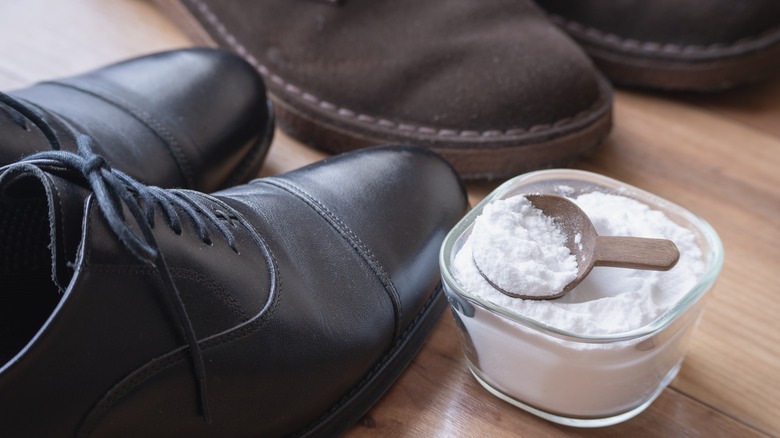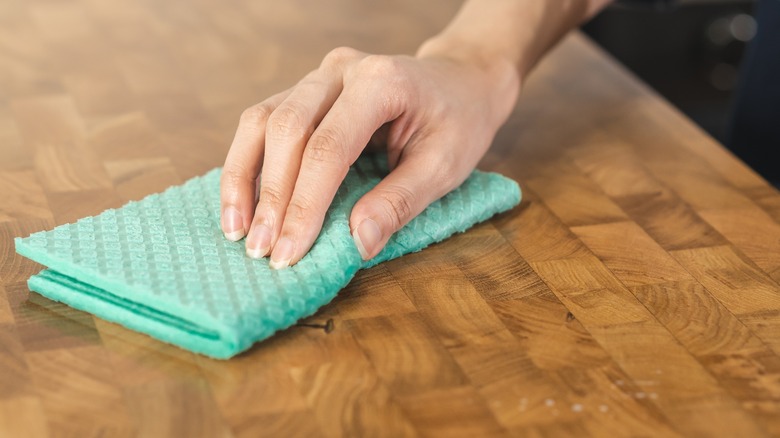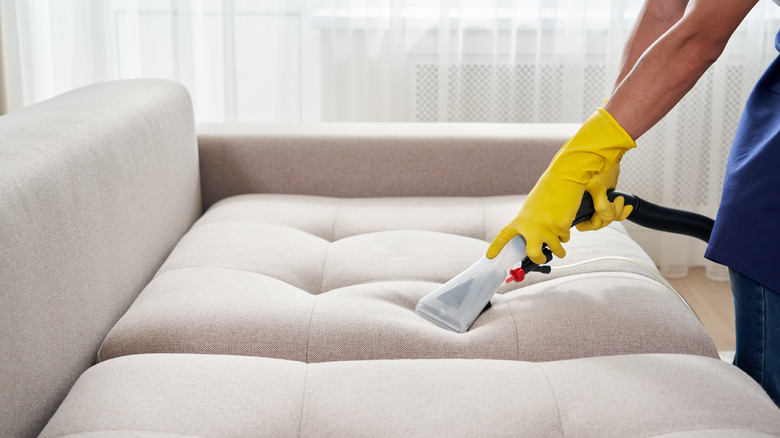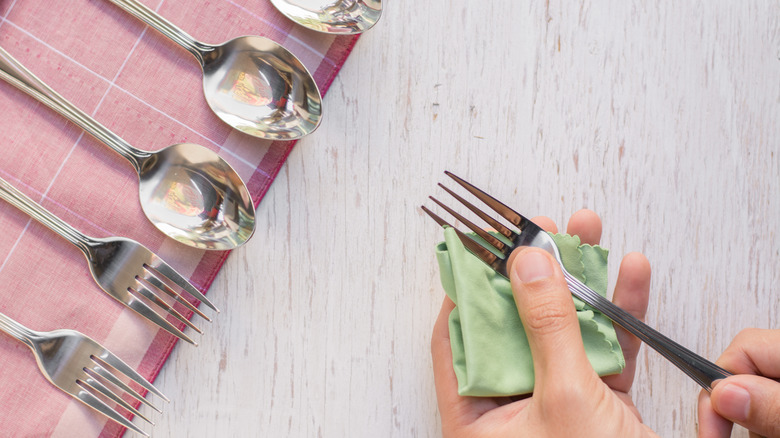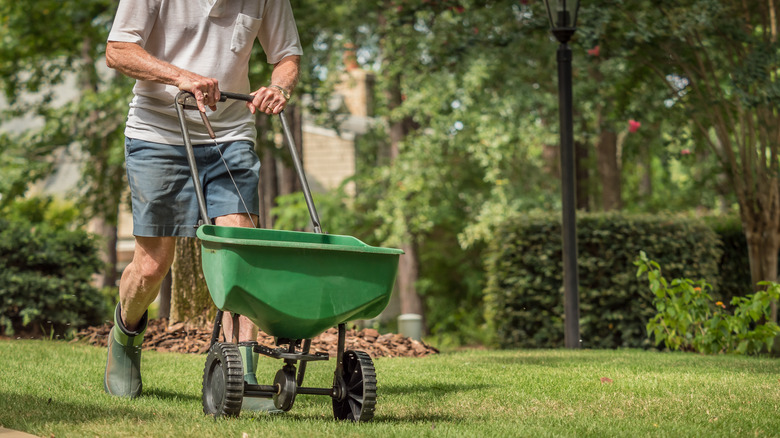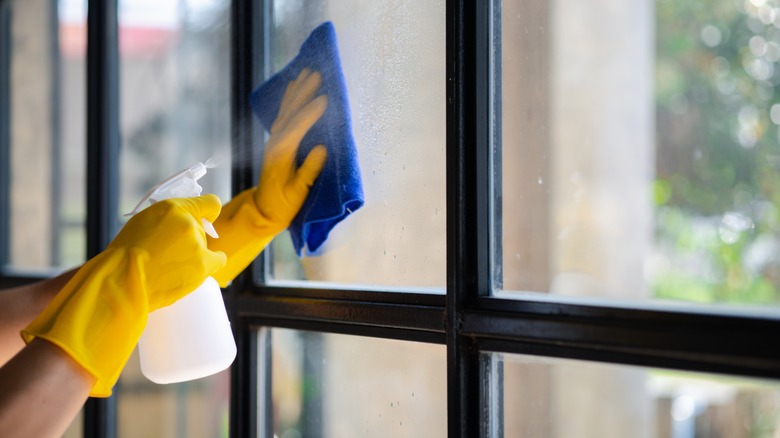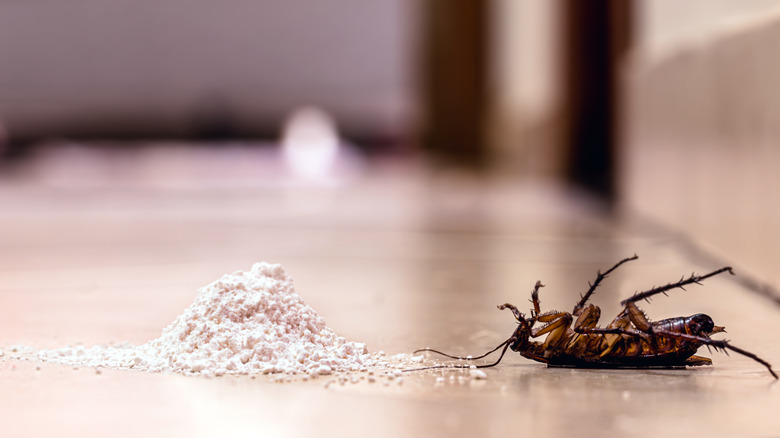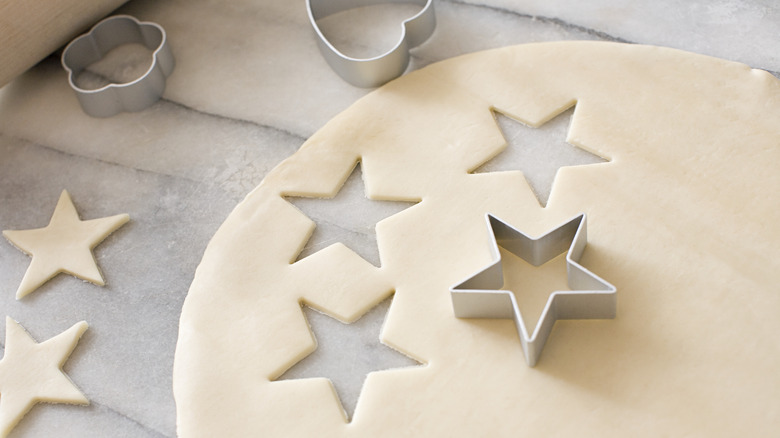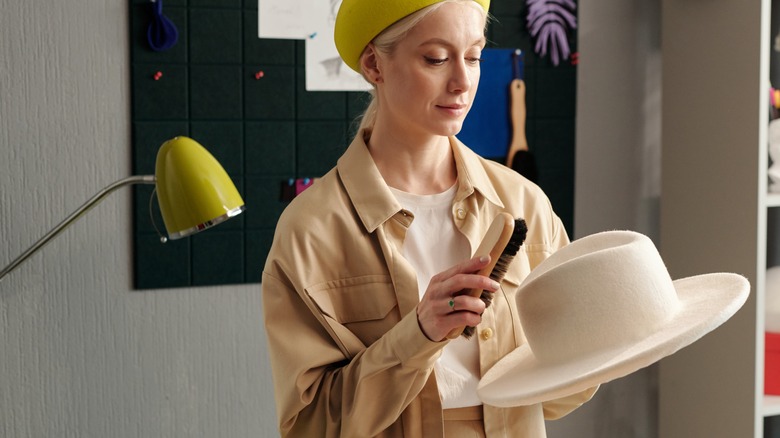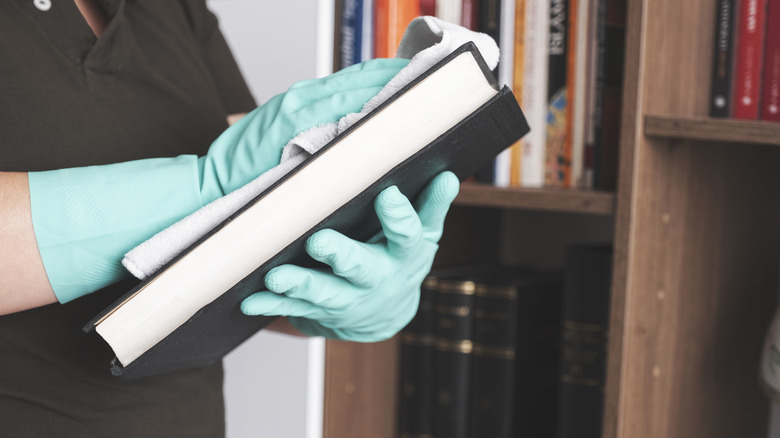Unconventional Uses For Cornstarch Around The House
We may receive a commission on purchases made from links.
Cornstarch is a gluten-free carbohydrate produced from a corn kernel's endosperm — the huge, yellow outer portion. Though this powder has been traditionally used to thicken soups and gravies, there are several other unconventional uses for cornstarch around the house. Because it's naturally abrasive — but not harsh to delicate surfaces due to its soft texture — maize starch makes for an excellent cleaning agent. It's also a great absorbent and can easily soak up water and grease from various materials like hats and books. It can also be used to get rid of foul odors, such as stinky footwear.
Moreover, cornstarch boasts a neutral pH, meaning this product is right in the middle and doesn't belong to the alkaline or acidic camp. It can also be easily combined with other cleaning agents such as baking soda. The best part, though? It is readily available and won't burn a hole in your pocket, as you can buy a 16-ounce box of cornstarch from Whole Foods Market for under $3 on Amazon. So keep some maize powder handy and explore how you can use this unassuming ingredient around your house.
To clean and shine wooden furniture
Despite being sturdy, durable, and timeless, wooden furniture requires regular upkeep to continue looking like new. However, commercial polishes or DIY solutions can often leave a filmy wax coating on them. So, instead of making peace with the sticky surfaces, use an unexpected product after polishing your wooden furniture: cornstarch. Grab some powder and lightly sprinkle it on the newly polished surface. After you've covered everything, simply use a clean microfiber cloth to get rid of the powder and the stickiness.
As it's derived from corn, this carbohydrate-rich powder is abrasive and will readily absorb the excess oil from the furniture polish, breathing new life into wooden fixtures around your home. If you find the above method too messy, grab a spray bottle, mix cornstarch and water in a 1:1 ratio, and sprinkle the solution directly onto wooden furniture. This won't just get rid of the stickiness, but also clean dirty furniture. You can apply cornstarch on wooden stairs and banisters to prevent slipping accidents, too. Don't forget to wear rubber gloves in case you're allergic to cornstarch to avoid touching it directly.
To remove grease stains from the couch and carpet
Stubborn grease stains on your microfiber couch might be your worst nightmare come to life. Fortunately, you don't have to break your back or bank trying to clean your microfiber couch. Simply get some cornstarch and apply it to the stains. Next, use a gentle toothbrush to work it in. This will make it easier for the powder to soak up the grease. Once you're done, let it work its magic for an hour or so before running a vacuum cleaner over it.
Being abrasive and naturally absorbent, it'll soak up the grease without being harsh on the surface. Remember, you might have to repeat the process a couple of times to eliminate incredibly stubborn stains. However, if you're looking to clean your suede couch, a better approach would be to sprinkle some cornstarch on the stain and leave it undisturbed for 10 minutes so it can soak up the oil. After the time is up, clean the surface with a sponge or cloth dipped in vinegar. Finally, gently brush the stained area with a soft brush and vacuum away the residue.
Similarly, you can use cornstarch to remove stains from your rugs. Mix the powder with water or distilled white vinegar to make a thick paste. Apply it on the affected area and wait for a few hours until the surface turns rigid before vacuuming the dust away.
To clean silver and silver-plated items
Silverware is often made of a combination of silver and copper to create lasting items, but it's susceptible to tarnishing when exposed to moisture, chlorine, and salty air. Bleach and harsh cleaning agents don't do it any favors, either. However, before you take your prized silverware to a jeweler for polishing, use cornstarch to clean your silver-plated items without using any chemicals. All you need to do is mix water and cornstarch in a 2:1 ratio. Once you've got a thick paste, apply it directly on the tarnished or dirty surface using a damp microfiber cloth.
Now, let the item dry for around 15 minutes before rubbing it off with another clean microfiber towel. For best results, wipe a dry cloth along the length of the item to polish it. The abrasive granular particles of the powdery starch will help get your silverware and silver-plated items squeaky clean. However, test this solution on a small spot before using this DIY solution on your expensive silver and silver-plated items. In case you don't have cornstarch handy, substitute it with cream of tartar.
To transform your garden
Few things in life might bring you more joy than seeing your garden bloom and come to life. Unfortunately, garden maintenance can sometimes take a backseat when you're busy with other parts of your life. Luckily, you can use cornstarch to transform your garden in multiple ways. For instance, it's a natural insecticide that'll help you get rid of worms. Just sprinkle a little cornstarch on the leaves to swiftly eliminate the pests feeding on them. The abrasive texture of the powder will make it difficult for them to skedaddle while simultaneously killing pests ingesting it.
Moreover, you can sprinkle some maize powder onto the soil to enrich it with calcium, potassium, magnesium, and phosphorus, improving its health and promoting plant growth. You can also use it as a natural fertilizer for your lawn. A rule of thumb is to pour 10 pounds of cornstarch every 1,000 square feet before watering the surface to let lush foliage take over. Further, if improper drainage or overwatering is an issue, rotting roots will be a thing of the past with this common household staple. Simply dig up some soil around the affected plant to get to the roots and apply cornstarch. The maize powder will quickly absorb the excess water and breathe new life into the affected plants.
To clean doors and windows
Cleaning the dust off the glass panes of your doors and windows can often seem effort-intensive since they're prone to streaks. Luckily, you can clean your windows and enjoy a streak-free finish by combining 2 tablespoons of cornstarch with a ½ cup of water. Once the solution is ready, dip a microfiber cloth (or gentle sponge) in it before rubbing it across your dirty doors and windows. Wait for five minutes, then use another clean cloth to wipe away the solution.
Cornstarch's abrasive and cleaning properties will polish the glass panes. Additionally, it'll help you get rid of the dreaded streaks. However, if you need a stronger solution, substitute your window cleaner with cornstarch to notice the difference. Mix 2 tablespoons of cornstarch, ½ a cup of white vinegar and ammonia (or rubbing alcohol), and 3 to 4 quarts of warm water in a large container. Then, pour this mixture into a spray bottle and sprinkle it on your glass doors and windows. Finally, wipe the solution with a cloth soaked in warm water before using a dry microfiber cloth to buff the surface. Cornstarch's abrasiveness, combined with vinegar and ammonia cleaning powers, will make the glass panes shine without the streaks.
To control roaches
It can be difficult to evict unwanted house guests from your home, especially the disease-spreading and tenacious kind like cockroaches. If you're struggling with a roach infestation and would rather not use harsh chemicals like boric acid to get rid of them, grab some cornstarch for your kitchen pantry. While you're at it, get some Plaster of Paris, too. Mix the two ingredients equally and sprinkle the resultant powder in nooks and crannies frequented by these pests. Think of moist, warm, and dark spaces preferred by these nocturnal creatures.
After the trap is laid, sit back and watch as cockroaches feast on the mixture and drop dead after some time. Because it's absorbent, the maize powder will dehydrate them and make them seek water to quench their thirst. However, water will activate the Plaster of Paris in their stomach, leading to their untimely demise. Take care to avoid adding any water to the mixture, as that will activate the Plaster of Paris, turning it ineffective. Additionally, since this mixture can be toxic to children and pets, ensure you don't accidentally sprinkle it anywhere they can reach it.
To make Christmas ornaments
If you love eco-friendly DIY Christmas ornaments to adorn your conifers, combine 2 cups of baking soda and 1 cup of cornstarch in a saucepan or pot on medium heat and add 1¼ cups of water to create a mixture. Stir continuously until you reach a paste-like consistency (don't worry; it usually only takes five minutes). To personalize the ornaments, add a few drops of your favorite essential oils and food coloring. Once the mixture is thick, take it off the stove, cover it with a moist cloth, and let it cool to room temperature. Then knead it into a dough into a ball. Sprinkle a little cornstarch on the surface before kneading, and grab a rolling pin.
Use the pin to stretch the dough, but ensure it isn't thicker than 6mm or too thin, as it'll be difficult to lift off the surface or break off easily. Now, use a cookie cutter to cut the dough into the desired shapes. Poke a hole at the top using a straw or chopstick to make room for a ribbon. Place them on parchment paper and let them air dry for 24 hours, flipping them once to make sure that both sides dry and harden. If you're in a hurry, put them in the oven at about 175 degrees Fahrenheit (80 degrees Celsius), turning them in 30 to 40 minutes. Since cornstarch is sturdy and tensile when dry, it's a good ingredient for creating affordable and lasting ornaments.
To clean hats
Hats can be a trusty accessory during workouts, hiking, cycling, vacations, and horse riding. However, exposure to natural elements like the sun and dust can soon have them looking dirty and dull. The situation worsens if you find grease or sweat stains on them. But before you toss your hat away, get your hands on some cornstarch to lift the stain. Hold your stained hat with one hand and sprinkle maize powder on top of the stain with the other. Be careful not to overdo it and dust only about half a tablespoon or 0.25 ounces of the powder, as it'll be difficult to get out the excess.
After sprinkling the product, use a soft brush to gently work it in and allow it to absorb the stain. Now, let the powder sit undisturbed for five to 10 minutes, depending on how deep the stain is, before brushing it away carefully. If the stain persists, repeat the process a couple of times until it's no longer visible. Cornstarch is an excellent absorbent and will easily soak up moisture and grease on your hats without damaging them.
To keep books in tip top shape
Do you love reading books and stacking them around your house? Caring for and cleaning books properly is equally important to ensure they last long and remain damage-free. For instance, if you accidentally spill water on your novel, spring into action immediately and dry the pages out by placing a dry soft cloth or paper towel on each page, opening the damaged pages in front of a fan to speed along the drying process. Remember, if the spillage is especially bad or you get caught in a downpour, you'll have to change the cloth or towel every 10 to 15 minutes till the book is no longer dripping.
Once the book begins drying, sprinkle cornstarch on the most affected areas and set it in front of a fan or a ventilated spot away from sun exposure. The powder will absorb the excess moisture from the water-damaged pages and prevent mildew formation. Once the book is dry, dust away the residual granules. Similarly, if you're dealing with nasty grease stains, dust them with cornstarch, cover them with a paper towel, and shut the book before placing some weight on top and leaving it alone for a day. Once the stain is gone, remove the towel and remaining dust from the book. Since cornstarch readily absorbs moisture, grease, and oil, it's ideal for saving your favorite books from damage and mildew.
